As loving pet parents, it’s natural to want to share everything with our furry companions, especially delicious snacks. However, a common misconception is that if a food is safe for humans, it’s automatically safe for dogs. This isn’t always true, particularly when it comes to fruits. Dogs metabolize foods differently than humans, and introducing the wrong fruits can lead to significant health issues, ranging from an upset stomach to life-threatening conditions. Understanding what fruits dogs can’t have is crucial for ensuring your canine’s health and well-being.
While dogs are omnivores and can derive some benefits from certain fruits and vegetables as occasional treats, these items are not essential components of their primary diet. The key lies in knowing which fruits are safe, which should be avoided at all costs, and how to properly prepare the safe ones. This guide will provide detailed information to help you make informed decisions, ensuring your dog enjoys a healthy and happy life without accidental exposure to harmful fruits. It’s vital to prioritize their safety and stick to veterinarian-approved dietary practices. For more information on what fruits and vegetables can dogs not have, consider exploring additional resources. what fruits and vegetables can dogs not have
Fruits Dogs Can Safely Eat in Moderation
Many fruits offer a healthy and delicious treat option for dogs when given in moderation. These fruits are packed with essential vitamins, minerals, and antioxidants that can contribute to your dog’s overall health. Always remember to prepare them correctly by removing seeds, pits, and tough skins, and introduce them slowly to monitor for any adverse reactions.
Apples
Apples are an excellent choice, providing a rich source of vitamins A and C, along with beneficial fiber. Their low protein and fat content make them an ideal snack, especially for senior dogs. Before offering apples to your dog, always remove the seeds and core, as apple seeds contain small amounts of cyanide. For a refreshing treat on a warm day, try freezing apple slices. Many commercial dog treats also incorporate apple as a healthy ingredient.
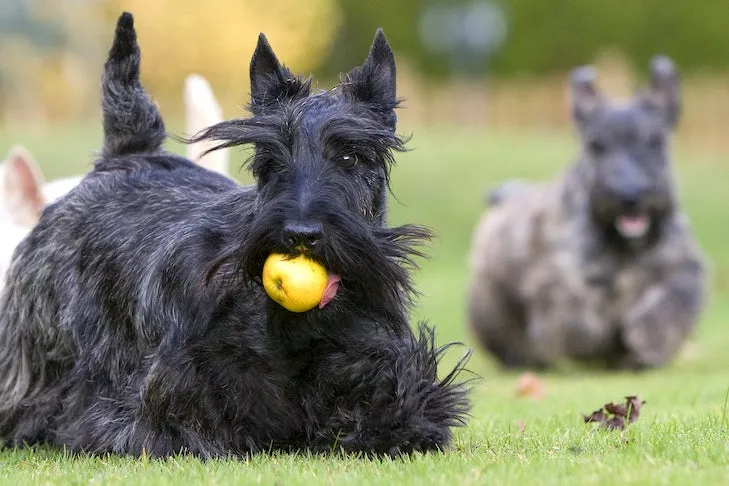 Two Scottish Terriers playing happily in a lush green grass field.
Two Scottish Terriers playing happily in a lush green grass field.
Bananas
Bananas are a great low-calorie treat for dogs, rich in potassium, vitamins, biotin, fiber, and copper. They are also low in cholesterol and sodium. However, due to their high sugar content, bananas should only be given as an occasional treat and not as a regular part of your dog’s diet. You can mash them into a toy or freeze small slices for a cool snack.
Blueberries
Often hailed as a superfood, blueberries are packed with antioxidants that help protect against cell damage in both humans and canines. They are also rich in fiber and phytochemicals. Their small size makes them perfect for training rewards or for teaching your dog to catch treats. Blueberries are a popular ingredient in many dog treats, sometimes combined with other healthy components like yogurt.
Cantaloupe
Cantaloupe is a nutrient-dense fruit that is low in calories and an excellent source of water and fiber, making it hydrating. Be mindful of its relatively high sugar content, however, and offer it in moderation, especially if your dog is overweight or has diabetes. Freezing small cubes of cantaloupe can provide a refreshing and enriching summer snack for your canine friend.
Cranberries
Both fresh and dried cranberries are safe for dogs in small quantities, although their tart taste might not appeal to every dog. As with any treat, moderation is crucial, as too many cranberries can lead to an upset stomach. It’s important to note that many dried cranberries sold for human consumption are sweetened, adding unnecessary sugar to your dog’s diet. Opt for unsweetened fresh or frozen cranberries, or select dog treats specifically formulated with cranberries.
Cucumbers
Cucumbers are an exceptionally good treat for dogs, particularly those who are overweight, as they contain very few carbohydrates and fats, and are full of hydrating water. They are loaded with vitamins K, C, and B1, along with potassium, copper, magnesium, and biotin. Cool cucumber slices make an excellent hot-weather treat, and freezing them can add an extra element of fun and enrichment.
Mango
This sweet, juicy tropical fruit is a powerhouse of vitamins A, B6, C, and E, as well as potassium and beta-carotene and alpha-carotene. When feeding mango to your dog, always remove the hard pit first. The pit contains small amounts of cyanide and poses a significant choking hazard. Due to its high sugar content, mango should be an occasional treat, especially for dogs prone to weight gain. Consider mango-flavored dog treats for a less messy way to provide these nutrients.
Oranges
Veterinarians confirm that oranges are fine for dogs in small amounts, though some dogs may be deterred by the strong citrus smell or taste. Oranges are an excellent source of vitamin C, potassium, and fiber. Only offer your dog the juicy flesh, ensuring all seeds and the peel are removed. Orange peel is difficult for dogs to digest, and its oils can be off-putting. If your dog doesn’t enjoy fresh oranges, there are dog treats that contain orange as an ingredient.
Peaches
Small quantities of fresh or frozen peaches (cut into pieces) are a good source of fiber and vitamin A. Crucially, like cherries, peach pits contain cyanide. Ensure the flesh is completely separated from the pit and that the pit is safely discarded in a dog-proof receptacle. Canned peaches should be avoided due to their high sugar syrup content, even those labeled “in natural juice.” Frozen peach slices can be a delightful and cooling treat during warm weather.
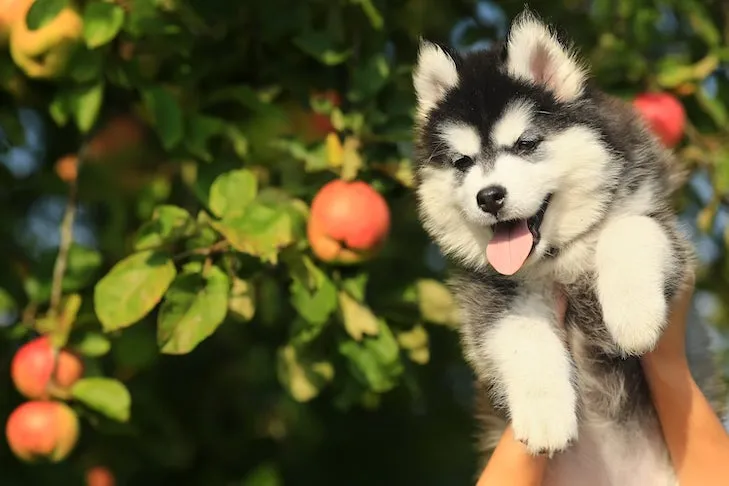 A Siberian Husky puppy being gently held up in front of an apple tree.
A Siberian Husky puppy being gently held up in front of an apple tree.
Pears
Pears are a nutritious snack, high in copper, vitamins C and K, and fiber. When sharing pears with your dog, always cut the flesh into bite-sized chunks and remove the core and seeds, as the seeds contain traces of cyanide. Avoid canned or jarred pears, even those in their own juice, due to added sugars. Pear-flavored dog treats are also available, often combined with other beneficial ingredients like duck or salmon.
Pineapple
A few chunks of fresh pineapple can be a sweet treat for dogs, provided the tough, prickly outer peel and crown are removed. This tropical fruit is rich in vitamins, minerals, and fiber. It also contains bromelain, an enzyme that aids dogs in absorbing proteins. As with other fruits, do not offer canned or packaged pineapple in sweetened syrups, as dogs do not need added sugars, especially if they are prone to obesity. Pineapple dog treats offer a convenient alternative.
Pumpkin
Pure pumpkin is a highly beneficial food for dogs. It’s packed with antioxidants and is renowned for its ability to help relieve both diarrhea and constipation in dogs. If using canned pumpkin, always choose 100% pumpkin puree, avoiding pumpkin pie filling which contains spices and added sugars. You can also roast and peel fresh pumpkin. Many pumpkin supplements and dog treats are available, harnessing its digestive benefits.
Raspberries
Raspberries are safe for dogs in moderation and contain beneficial antioxidants. They are low in sugar and calories but high in fiber, manganese, and vitamin C. Raspberries are particularly good for senior dogs due to their anti-inflammatory properties, which can help support aging joints. However, raspberries contain small, naturally occurring amounts of xylitol, so limit your dog to no more than 8 ounces of fresh or frozen raspberries. Dog treats that include raspberry are also an option.
Strawberries
Strawberries are an excellent source of fiber and vitamin C. They also contain an enzyme that can help whiten your dog’s teeth. Like all fruits, strawberries contain natural sugars, so they should be offered in moderation. Frozen strawberries make a fun enrichment treat. Alternatively, you can use strawberry-flavored training treats hidden in a snuffle mat for a mentally stimulating activity.
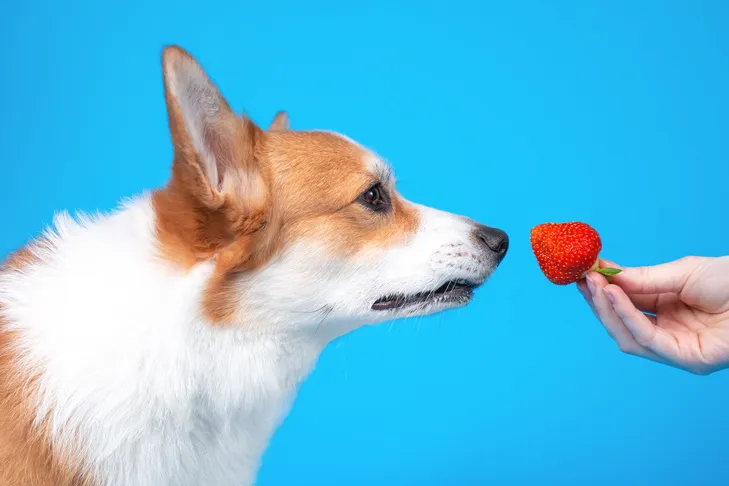 A Pembroke Welsh Corgi inquisitively sniffing at a ripe strawberry on a blue background.
A Pembroke Welsh Corgi inquisitively sniffing at a ripe strawberry on a blue background.
Watermelon
Dogs can enjoy watermelon, but it’s crucial to remove all seeds and the rind beforehand, as they can cause intestinal blockages. The flesh of watermelon is safe and nutritious, packed with vitamins A, B-6, and C, as well as potassium. Composed of 92% water, it’s an excellent way to keep your dog hydrated on hot summer days. Freezing chunks of seeded watermelon provides a refreshing and engaging treat. Many watermelon-flavored dog treats are also available.
What Fruits Dogs Can’t Have: Dangerous Fruits to Avoid
While many fruits are perfectly healthy for human consumption, they can contain compounds, seeds, or parts that are dangerous, if not toxic, to dogs. It is imperative to keep these fruits out of your dog’s reach to ensure their safety and prevent serious health emergencies. Understanding what fruits dogs can’t have is a critical aspect of responsible pet ownership.
Avocado
Despite being a healthy snack for humans, avocado should not be given to dogs. The pit, skin, and leaves of avocados contain persin, a toxin that can cause vomiting and diarrhea in dogs. While the fleshy inside of the avocado fruit contains less persin, it can still be problematic for dogs. Avocado flesh is also high in fat, which can lead to gastrointestinal upset or contribute to health conditions like pancreatitis if consumed in large quantities. If you wish for your dog to benefit from avocado’s properties, look for dog treats formulated for skin and coat health that include avocado as an ingredient.
 A Rottweiler laying down calmly in a grassy yard, its head tilted slightly.
A Rottweiler laying down calmly in a grassy yard, its head tilted slightly.
Cherries
With the exception of the fleshy fruit around the seed, all parts of the cherry plant, including the stems, leaves, and particularly the pits, contain cyanide. Cyanide is highly toxic to dogs as it disrupts cellular oxygen transport, meaning their blood cells cannot effectively carry oxygen. If you have a cherry tree, ensure your dog does not have access to fallen fruit. Ingesting whole cherries or cherry pits can lead to cyanide poisoning, symptoms of which include dilated pupils, difficulty breathing, and red gums, all of which constitute a veterinary emergency. When eating cherries yourself, ensure discarded pits are secured in a dog-proof trash can, and educate children about not sharing cherries or their pits with your dog. For a safe way to give your dog cherry benefits, consider cherry-flavored dog treats. If you’re wondering about what fruits can dog not have, cherries are definitely on the list. what fruits can dog not have
Grapes and Raisins
If you suspect your dog has eaten grapes or raisins, contact your veterinarian immediately. Grapes and raisins are highly toxic to dogs, regardless of breed, sex, or age. Their consumption can lead to acute sudden kidney failure, a life-threatening condition. Always be extremely vigilant about this dangerous fruit around dogs, especially if children in your household eat grapes or raisins. Dispose of grapes or raisins in a secure, dog-proof trash can or bin to prevent accidental ingestion, and never add them to a compost heap that your dog can access. This is one of the most critical items when discussing what fruits can dogs not have. what fruits can dogs not have
Tomatoes (Green Parts)
While the ripened red flesh of a tomato fruit is generally considered safe for dogs, the green parts of the tomato plant—leaves, stems, and unripe green tomatoes—contain a toxic substance called solanine. Although a dog would typically need to consume a large quantity of the plant material to become severely ill, it’s safer to avoid giving tomatoes altogether. If your dog enjoys exploring the garden, take steps to prevent them from accessing your tomato plants. For a clearer understanding of safe and unsafe options, refer to comprehensive lists on what fruits can dogs have and not have. [what fruits can dogs have and not have](https://dogcarestory.com/what-fruits-can-dogs-have-and not-have/)
Vegetables Dogs Can Safely Eat
Just like fruits, many vegetables can be a healthy addition to your dog’s diet when offered correctly and in moderation. These provide essential nutrients and fiber. Always ensure vegetables are plain, unseasoned, and cut into appropriate sizes to prevent choking.
Broccoli
Broccoli is safe for dogs in small amounts and is best served as an occasional treat. It’s high in fiber and vitamin C and low in fat. However, broccoli florets contain isothiocyanates, which can cause mild to potentially severe gastric irritation in some dogs if consumed in large quantities. The tough stalks have also been known to cause esophageal obstructions. To mitigate these risks, it’s better to offer cooked broccoli. Alternatively, a broccoli-shaped chew toy can satisfy their desire to gnaw.
Brussels Sprouts
Brussels sprouts are packed with nutrients and antioxidants beneficial for both humans and dogs. However, feeding too many to your dog can lead to excessive gas. If your dog enjoys them and you are prepared for the potential side effects, they can be a nutritious treat. Some dehydrated dog foods also include these leafy greens as an ingredient.
Carrots
Carrots are an excellent low-calorie snack, high in fiber and beta-carotene, which is converted to vitamin A. Chewing on this crunchy root vegetable can also help clean your dog’s teeth. Carrots are a common ingredient in many dog foods and numerous carrot-flavored dog treats.
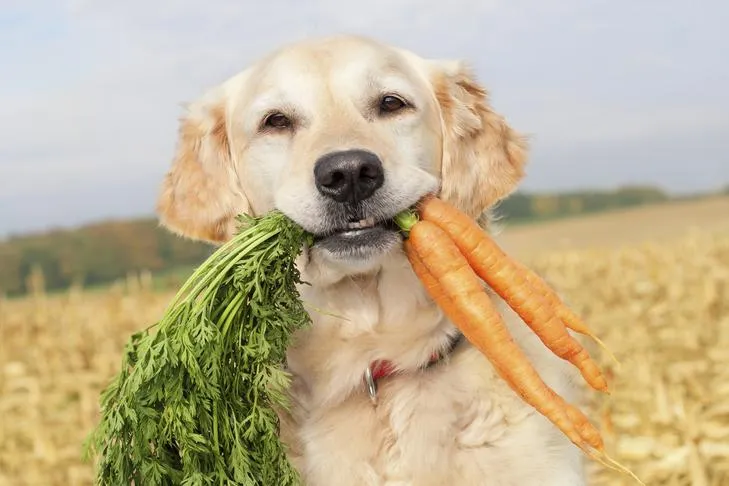 A happy Golden Retriever holding two fresh carrots gently in its mouth.
A happy Golden Retriever holding two fresh carrots gently in its mouth.
Celery
Beyond vitamins A, B, and C, celery contains nutrients that can promote heart health and potentially help fight cancer. An added bonus is that celery is also known for its ability to freshen doggy breath. Celery dog chews are available for dogs who enjoy the crunch.
Green Beans
Chopped, steamed, raw, or canned (plain, no salt added) – all types of green beans are safe for dogs to eat. They are full of important vitamins and minerals, rich in fiber, and low in calories. Opt for no-salt canned green beans or fresh/frozen varieties. Frozen green beans can also serve as fun enrichment snacks.
Peas
Green peas, snow peas, sugar snap peas, and garden or English peas are all acceptable for dogs occasionally. Peas provide several vitamins, minerals, and are rich in protein and high in fiber. You can feed your dog fresh or frozen peas, but avoid canned peas with added sodium.
Spinach
Dogs can eat spinach, but it might not be the best vegetable to share regularly. Spinach is high in oxalic acid, which can block the body’s ability to absorb calcium and potentially lead to kidney damage. While a dog would likely need to consume a very large amount to experience these problems, choosing other vegetables might be a safer bet. For the benefits of spinach in a safer form, consider spinach-flavored dog treats as an occasional snack.
Vegetables Dogs Should Avoid: Potential Risks
While many vegetables offer health benefits, some can be toxic or harmful to dogs. Knowing which ones to avoid is just as important as knowing which ones are safe.
Asparagus
Asparagus isn’t necessarily toxic to dogs, but it offers very little benefit. It’s too tough to be eaten raw, and by the time it’s cooked soft enough for dogs, much of its nutritional value is lost. There are plenty of other more beneficial vegetable options if you want to share a healthy treat with your dog.
Mushrooms (Wild)
Wild mushrooms can be highly toxic and dangerous for dogs. While only a small fraction of mushroom species are poisonous, the toxic ones can cause severe illness or even death. Always consider wild mushrooms a solid “no.” Washed mushrooms purchased from a supermarket for human consumption are generally fine for dogs in small amounts, but it’s often safer to avoid them altogether to prevent any confusion with wild varieties.
Onions, Leeks, and Chives
Dogs should never eat onions, leeks, or chives. These belong to the Allium family of plants, which are poisonous to most pets, especially cats. Ingesting onions can cause your dog’s red blood cells to rupture, leading to anemia, and can also cause vomiting, diarrhea, stomach pain, and nausea. Poisoning from onions can be more severe in Japanese breeds like Akitas and Shiba Inus, but all dogs are susceptible. Ensure children in your household do not share foods containing onions with your dog, and secure leftovers where your dog cannot access them. For a deeper dive into the dangerous options, including what fruits can t dogs have, review reliable resources. what fruits can t dogs have
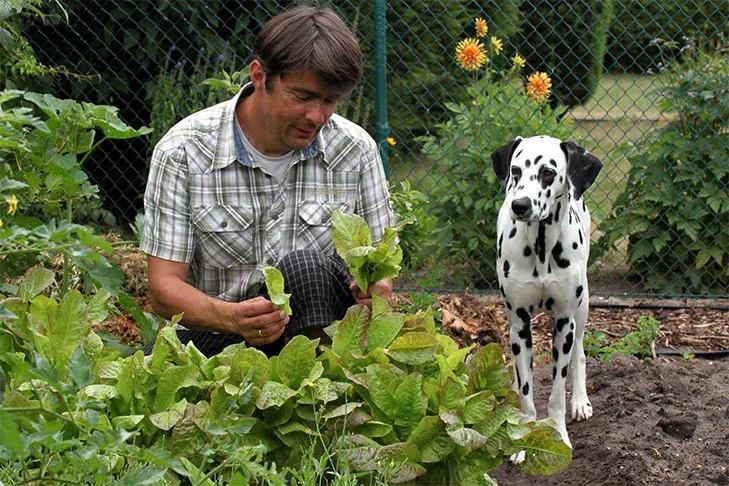 A Dalmatian dog watching a man gardening and picking leaves in a sunny outdoor setting.
A Dalmatian dog watching a man gardening and picking leaves in a sunny outdoor setting.
Conclusion
Understanding what fruits dogs can’t have is fundamental to protecting your beloved pet’s health. While it’s tempting to share your favorite human snacks, many common fruits and vegetables can pose serious health risks to dogs. Always prioritize your dog’s safety by thoroughly researching any new food before offering it, and by removing all seeds, pits, and potentially harmful parts. When in doubt, it’s always best to consult with your veterinarian before introducing new foods into your dog’s diet, especially those not specifically formulated for canines. By being vigilant and informed, you can ensure your dog enjoys a varied diet of safe and healthy treats without compromising their well-being. Continue exploring our website for more expert advice on dog care and nutrition.
